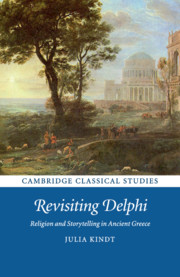Book contents
- Frontmatter
- Dedication
- Contents
- List of Illustration
- Acknowledgements
- List of Abbreviations
- 1 Introduction: Revisiting Delphi
- 2 Herodotus: Delphi, Oracles and Storytelling in the Histories
- 3 Euripides: Ironic Readings of Apollo and his Prophecies
- 4 Plato: Socrates, or Invoking the Oracle as a Witness
- 5 Pausanias: What's the Stuff of Divinity?
- 6 Athenaeus: Encountering the Divine in Word and Wood
- 7 Conclusion: Religion and Storytelling in Ancient Greece
- Appendix: Plutarch – A Philosophical Enquiry into an Enigmatic Divine Sign
- Bibliography
- Index
4 - Plato: Socrates, or Invoking the Oracle as a Witness
Published online by Cambridge University Press: 05 September 2016
- Frontmatter
- Dedication
- Contents
- List of Illustration
- Acknowledgements
- List of Abbreviations
- 1 Introduction: Revisiting Delphi
- 2 Herodotus: Delphi, Oracles and Storytelling in the Histories
- 3 Euripides: Ironic Readings of Apollo and his Prophecies
- 4 Plato: Socrates, or Invoking the Oracle as a Witness
- 5 Pausanias: What's the Stuff of Divinity?
- 6 Athenaeus: Encountering the Divine in Word and Wood
- 7 Conclusion: Religion and Storytelling in Ancient Greece
- Appendix: Plutarch – A Philosophical Enquiry into an Enigmatic Divine Sign
- Bibliography
- Index
Summary
Introduction
The basic facts of the case are well established: in 399 BCE Socrates, then in his seventieth year and arguably Athens’ most (in)famous philosopher, was accused of impiety (asebeia) as well as of corrupting the youth. He was tried in front of a citizen jury of 501 judges, found guilty and sentenced to capital punishment. He was executed by hemlock in the presence of some of his closest friends and admirers. With his death Athens lost an illustrious public figure and an intellectual who, for decades, had been a feature of public life in the city.
Plato and Xenophon, both students and admirers of Socrates, tell the story of his trial. Their respective Apologies are accounts of Socrates’ defence at court – if one may want to call it that. As some scholars (and indeed Xenophon himself) have pointed out, Socrates’ address to the citizen jury borders at times on the offensive and frivolous, in many ways confirming the prejudice held against him. Overall his speech at court seems to have antagonised rather than appeased the jury, with the result that a majority of jurors (albeit a relatively slim one) found him guilty as charged and an even greater number of jury members subsequently condemned him to death.
Plato's account is much more detailed than Xenophon's, stretching over thirty-five pages in the OCT edition (Xenophon's, by contrast, covers a mere eight and a half OCT pages). Plato was himself present at the trial and so able to give a first-hand account of the proceedings. Yet his Apology is by no means a verbatim report of Socrates’ words spoken at court. His text ultimately offers a narration of Socrates’ address in light of his subsequent conviction and Plato's very own personal interest in presenting his teacher in a positive light. So while large parts of Plato's Apology look like a forensic speech, the dialogue offers perhaps above all an account of Socratic ethics from Plato's point of view.
In his appearance at court, Plato's Socrates variously refers to an oracle he allegedly received at Delphi many years earlier. Apparently his friend Chaerephon had once consulted the Pythia with the question whether anyone was wiser than Socrates. The oracle, which Socrates summarises for us only indirectly, without quoting it verbatim, had allegedly responded that nobody was wiser.
- Type
- Chapter
- Information
- Revisiting DelphiReligion and Storytelling in Ancient Greece, pp. 87 - 112Publisher: Cambridge University PressPrint publication year: 2016



